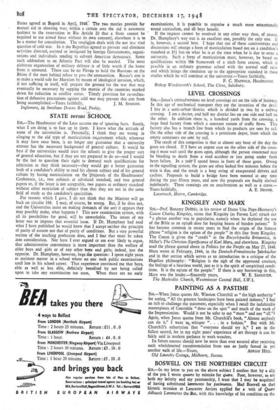STATE versus 'SCHOOL
SIR,—The Headmaster of the Leys accuses me of ignoring facts. Surely, what I am doing is to face up to them. I know what the attitude of some of the universities is. Personally, I think they are wrong in clinging to the old type of matriculation requirement which, whatever it may have once been, is no longer any guarantee that a university entrant has the necessary background of general culture. It would be best if the universities would trust the schools to give the proper sort of general education, but if they are not prepared to do so—and I would be the last to question their right to demand such qualifications for admission as they think necessary—they would get a better guarantee both of a candidate's ability to read his chosen subject and of his general culture by basing matriculation on the proposals of the Headmasters' Conference, i.e., two subjects at advanced standard, and two general papers or, if the latter is not acceptable, two papers at ordinary standard without other restriction of subject than that they are not in the same field of study as the candidate's specialities.
For reasons which I gave, I do not think that the Minister will go back on circular 168. I may, of course, be wrong. But, if he does not, and the Universities insist on making demands of the sort it appears they may possibly make, what happens ? This new examination system, with all its possibilities for good, will be unworkable. The intent of my letter was to impress that essential issue. If Dr. Humphrey had read what I have published he would know that I accept neither the principle of parity of esteem nor that of parity of conditions. But a very powerful section of the teaching profession does, and I fear that must be taken into consideration. Nor have I ever argued or am ever likely to argue, that administrative convenience is more important than the welfare of abler boys and girls or of any other boys and girls; indeed, just the opposite. Dr. Humphrey, however, begs the question: I spent eight years as assistant master in a school where no one took public examinations until late in his school career. That experience convinced me that boys, able as well as less able, definitely benefited by not being called upon to take any examination too soon, When there are no early examinations, it is possible to organise a much more educationally sound curriculum, and all boys benefit.
If the impasse cannot be resolved in any other way then, of course, Dr. Humphrey's way out is an excellent one, possibly the only one. It is, however, a second best. I hope that out of these controversies and discussions will emerge a form of matriculation based not on a candidate's standard at 151 but on what he is at the time when he is due to enter a university. Such a form of matriculation must, however, be based on qualifications within the framework of a sixth form course, which is possible in an ordinary grammar school with the normal staff ratio and which brings the candidate up to the appropriate standard in those studies which he will continue at the university.—Yours faithfully,
F. C. HAPPOLD, Headmaster. Bishop Wordsworth's School, The Close, Salisbury.


































 Previous page
Previous page